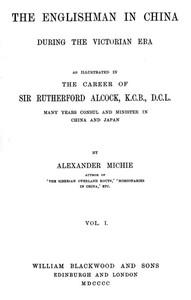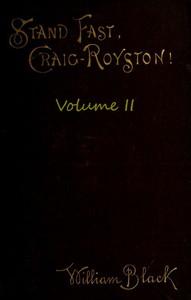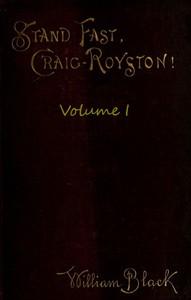|
|
Read this ebook for free! No credit card needed, absolutely nothing to pay.Words: 16586 in 4 pages
This is an ebook sharing website. You can read the uploaded ebooks for free here. No credit cards needed, nothing to pay. If you want to own a digital copy of the ebook, or want to read offline with your favorite ebook-reader, then you can choose to buy and download the ebook.

: The Englishman in China During the Victorian Era Vol. 1 (of 2) As Illustrated in the Career of Sir Rutherford Alcock K.C.B. D.C.L. Many Years Consul and Minister in China and Japan by Michie Alexander - Alcock Rutherford Sir 1809-1897; China Foreign relat@FreeBooksWed 07 Jun, 2023 dered violations of those laws. But the despatch of your Imperial Highness contains nothing to show that this principle will be carried out in practice. I stated instances in which the authorities, in spite of the remonstrances of her Majesty's consul, had deliberately set aside the letter of the treaty for no other object than to curtail the privileges of her Majesty's subjects. Your Imperial Highness in your reply does not allude to these cases, nor do you inform me that any steps have been taken to remedy these grievances or to prevent a repetition of such conduct. I am simply requested to send in a list of the grievances complained of; and I am informed that the local authorities will be urged to settle them with speed. Such a proposal is entirely unsatisfactory; for what reason have I to suppose that the instructions now to be sent by your Imperial Highness will be attended to, when I see that the orders which I am assured were given by your Imperial Highness for the redress of outrages such as ... have been disobeyed? In these State Papers the relations present and prospective between China and the outer world are accurately represented. Putting aside local and temporary questions, the despatches might be dated 1873, 1883, or 1893, for the position remained substantially the same during the three decades. The attitude of the British Minister we see to be one of hopeless pleading and vague admonition; of the Chinese Ministers, elastic resistance. One wonders how far, under the mask of dull decorum, the Chinese entered into the real humour of the situation: foreigners chafing impotently, but with their teeth drawn, occupying themselves largely with the preservation of China and the dynasty; urging reforms, military, financial, and administrative, while putting up with the non-fulfilment of the commonest obligations. Sir F. Bruce was much too wise a man not to be perfectly conscious of the negative result of foreign diplomacy in Peking. His private letters, some of which were published by Mr Lay in 1864, are more emphatic on the point than his public despatches. He saw it was a case for desperate remedies, but unfortunately he had no remedy except such as aggravated the disease. Like a drowning man, Sir Frederick Bruce clutched at one straw, then another--first at the inspectorate of customs, then at the collective body of his colleagues--to redress the balance which lay so heavily against him. We see in the despatch of June 12, 1863, the inception of what became known as the "co-operative policy." That was an arrangement by which the cause of one foreigner was to be made the cause of all, so that the treaty Powers might present a solid front to the Chinese. Unfortunately such a policy bears no fruit, since half-a-dozen Powers with separate interests, and of varying tempers, can only unite in doing nothing. The co-operative policy, therefore, by tying the hands of all the Powers, rendered the Chinese more secure than ever from outside interference. From Sir Frederick Bruce's despatches it may be gathered that the reason for the non-success of the Peking diplomacy was, that it was not founded on fact. It assumed that the Government of China was centralised instead of decentralised; that the administration of the empire hinged on the initiative of Peking, from which distant point the resident Ministers could protect their respective national interests throughout the empire. This hypothesis, which might have graced an academic debate, was acted upon as if it was a reality, and the struggle to make it so has absorbed the resources of diplomacy for forty years. The real fact, however, was quite otherwise. The distinctive character of Chinese Government is not autocracy, but democracy and provincial autonomy. The springs of action work from below, not from above, and to reverse this order of the ages was to convert a court of appeal into a court of first instance: to sue for a tradesman's debt before the Lord Chancellor, requiring the legal machinery to be first turned upside down. Diplomacy in China has thus been a disheartening effort to drive in a wedge by its thick end without adequate leverage. It is possible, indeed, that force might have accomplished even as much as that, but force was the one thing the use of which was proscribed. Notwithstanding these definite views, the experiment of forcing a centralisation which would have been a revolution on the unintelligible Government of China had to be continued through many weary years that were to follow, during which time the rights conferred by treaty on foreigners fell more and more into abeyance. The progress in that direction made in the two first years is thus summarised by Mr H. N. Lay, the first Inspector-General of Customs, on his return to China in 1863:-- FOOTNOTES: Peking and the Pekingese. Kunshan or Quinsan. NOTE ON OUR PRESENT POSITION AND THE STATE OF OUR RELATIONS WITH CHINA, BY CONSUL ALCOCK, JANUARY 19, 1849. The lesson of the past is very legibly written in the history of our relations,--oppression in the Chinese, increased by submission in the English. Resistance of the latter followed by concession in the former may be read in every stage, and the influence of the late war, beyond the tangible effects embodied in the provisions of the treaties, has been limited very much to outward forms: there is reason to suspect that the policy of the Chinese has been masked, not changed. Free books android app tbrJar TBR JAR Read Free books online gutenberg More posts by @FreeBooks
: Stand Fast Craig-Royston! (Volume II) by Black William - Grandfathers Fiction; Scotland Social life and customs 19th century Fiction; Families Fiction; Older people Fiction@FreeBooksWed 07 Jun, 2023

: Stand Fast Craig-Royston! (Volume I) by Black William - Grandfathers Fiction; Scotland Social life and customs 19th century Fiction; Families Fiction; Older people Fiction@FreeBooksWed 07 Jun, 2023
|
Terms of Use Stock Market News! © gutenberg.org.in2025 All Rights reserved.






